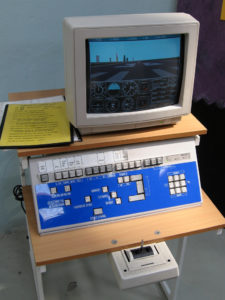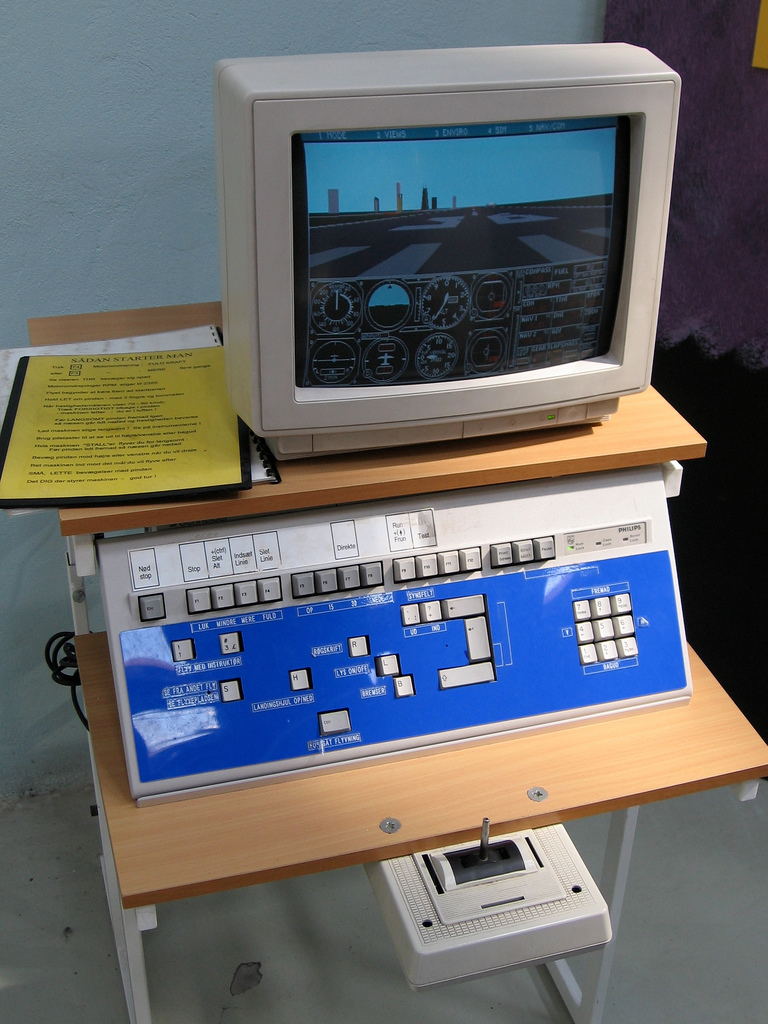I should have started with a simulator
When I got back in the cockpit, everything was very unfamiliar. Although things came back quick, I was completely confused as to the priorities, location of instruments, and what I needed to be doing when. While flying, I found myself having a very rough time figuring out what information I needed and where to get that information.
My instrument scanning skills were nonexistent. Things seemed to happen very fast. I have always been tech savvy and understand the value of technology but it never occurred to me to do some simulator work before my first flight. I believe some of this stemmed from the fact that when I was learning to fly the first time, flight simulators were games. The first real simulator I ever saw was at college. These simulators were IFR sims and did not have any screens. It was a plastic “cockpit” with instruments only. In fact, we used to sneak into the sims just to get some time behind the yoke when we couldn’t afford to do any actual flying.
Home simulator graphics back then looked more like pong than scenery. The mechanics were very choppy and there was no realistic physics to be found. If you could fly a plane on these simulators, all that it meant was that you could play video games.

Today’s simulators are vastly superior and very reasonably priced. Just a few hours on a simulator, in my opinion, would have helped me get back into the habit of scanning and just overall relearning the process and procedures of flying.

Two of the big competing simulators out now are Xplane and Microsoft Flight Simulator. It has been rumored however, that Microsoft will no longer be supporting and updating their flight simulator.
I should have interviewed flight instructors
When starting back, I got extremely lucky with flight instructors. Basically, I walked into the flight school, said I wanted to start flying and the very nice lady helping me out handed me two business cards. I called the first person, he answered, I explained that I had my pilot’s certificate but had not flown in over 22 years and I asked if he had time available to help be get back into the cockpit.
He turned out to be a great instructor for me. I do stress the “for me” part because I imagine that most instructors out there are good instructors. The experience levels are different, but they all have the basic knowledge especially teaching at the private pilot level.
By interviewing instructors, you can get a feel of who the person is and how they can benefit you. Instructor time is very valuable and not something you want to waist for your or their sake.
Some questions I would ask if doing it over:
- What are your goals as a pilot? I would ask this to see if he/she is planning to quickly move to another job. Having to switch instructors can cost you time and money.
- When (days and times) are you usually available to fly? This changes as we are all busy however, if he/she is only available from 8-5 during the week and you have to work those times, it is probably not going to work out very well.
- What kind of teacher/instructor are you? This is a question that I would use just to see what type of instruction this person gives and what they feel about teaching.
- How do you feel about questions over email or text? I realize that instructors are paid by the hour and I also realize that this should not be taken advantage of however, this can be a very valuable resource. I study outside of the airport a lot. Many things can be found on the internet with a good Google search but some things are better coming from your instructor. This is NOT asking if they respond immediately or even the same day but access on rare occasions is very valuable.
- Could I have three past student references? You are hiring this person and will be spending a lot of time and money with them. This should be approached no different than a job interview.
- If after our first lesson, will you be comfortable telling me if you would prefer not to work with me? This sound quite negative but it is more of an invitation for the instructor to realize that you are OK with them vetting you just as you are with them.
Below is a video created by Jason Shaffer from MZeroA on how to choose a flight instructor. Jason does a great job at explaining some other things to look for.
I would not have researched plane crashes so much
When I made the commitment to get back into flying, I scheduled two and a half hours with my new instructor. The problem was, it took me two weeks to get the paperwork done, get my schedule together and then to find a time that worked for us. In that two weeks I was very excited and nervous about getting back into flying.
Two decades ago, YouTube didn’t exist. Two decades ago, when you wanted to look things up we went to the library and looked things up in books. These books rarely documented airplane fails and crashes. Today, because of cell phones and live ATC it seems like you can watch almost every crash out there.
According to AOPA in 1994 when I was flying the crash statistics were…
Total Accidents: 2,022
Fatal Accidents: 404
Fatalities: 730
In 2010 (the latest numbers they had)…
Total Accidents: 1,384
Fatal Accidents: 267
Fatalities: 453
These numbers suggest that aviation is getting safer, not more dangerous. The issue is we have much more information available to us now than we had then. I’m not suggesting that studying accidents is a bad thing but just don’t over do it and if you choose to study them, use them as a learning tool to help you build your knowledge.
